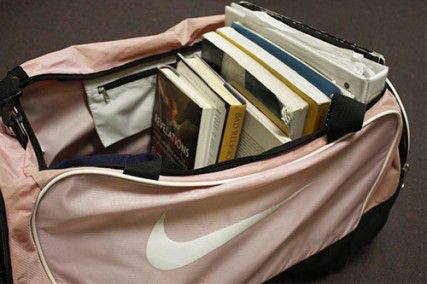
In a Thursday press call, NCAA officials called for colleges across the nation, including Boston University, to better integrate athletics and academics and ensure graduation rates among student-athletes meet certain standards.
While NCAA officials said during the conference that significant improvements must be made, Mike Lynch, BU’s assistant vice president and director of athletics, said the graduation success rates of BU student-athletes are among the best in the country.
“We are on par with our general student population here at BU,” Lynch said. “Of 340 Division I institutions, we were ranked 27th [for graduation success rate], so we are in the top 10 percent of institutions nationally.”
U.S. Secretary of Education Arne Duncan facilitated the press call, allowing experts to explain the necessity of a system that treats student-athletes as both students and as athletes.
During the call, Director of the Institute for Diversity and Ethics in Sports at the University of Florida Richard Lapchick said while graduation success rates have increased among college athletes, there is still progress to be made, specifically with regard to race.
The overall graduation success rate for male athletes increased to from 67 percent to 70 percent from 2012 to 2013, Lapchick said during the call. The rate for white male basketball players increased from 88 to 90 percent while the rate for African-American basketball players increased from 59 percent to 65 percent.
“While all that sounds good, that still leaves the enormous gap between white and African-American basketball players in the [March Madness] tournament,” he said. “The gap went from 28 percent in 2012 to 25 percent in 2013, but that’s still a huge issue for me and those who are following the two [men’s and women’s] tournaments.”
President and CEO of the National Association for the Advancement of Colored People Ben Jealous said the issue of balancing academics and athletics at colleges is one that comes down to leadership.
“When a coach prioritizes training the entire student athlete, the student succeeds,” Jealous said. “When the coaches focus on the athletic part of the equation and neglect the student part of the equation, they let down the team they have been hired to guide and to lead.”
While the graduation rate disparity between Caucasian and African-American male basketball players is 25 percent in 2013, the same disparity for female basketball players sits at just 6 percent, Lapchick said.
Lynch said while BU has proved to have a disparity between its male and female basketball teams as many other schools do, the margin is smaller than the national figure.
“We’re really happy that at BU, our basketball teams — most recently, our women’s team — has scored 100 percent [graduation rate] for decades,” Lynch said. “Our men’s basketball program has been in the 90 [percent range], and over the last eight years we’ve had a 100 percent graduation rate six of those eight years.”
For BU hockey, Lynch said that the most recent graduation rate was about 90 percent.
Jenna McLeod, a College of Arts and Sciences junior, said students and student athletes alike have a responsibility to themselves to keep focused on their academics.
“I don’t follow sports much, but I think that if you’re going to come to a university, especially one as expensive as BU, then you should definitely focus on your academics even if there are other things going on,” McLeod said.
Aubrey Giasson, a College of Engineering freshman, said academics are crucial in any college career and should be a student’s top priority.
“Most BU athletes would probably have a good relationship balancing athletics and academics,” she said. “BU has good, but not great, sports and schooling, which would probably make for an easier balance. Other than that, I think that someone’s academic standing is their own responsibility, whether or not they play sports.”
Joe McNiff, a School of Management junior, said students should focus on what is most important to them, whether it is athletics or academics.
“A lot of college athletes come to school just to play,” McNiff said. “If you have an athletic scholarship, I can understand that being [your] first priority.”
While Lapchick said he hopes to improve the balance between academic performance and sports performance in collegiate coaching contracts, Lynch said it would be unusual to find a coach at BU without balanced priorities.
“There are probably places where they [coaches] have such a poor history of academic performance [among players] so they might want to put something like that in a contract,” Lynch said. “But at BU, my feeling is if the coaches are not concerned that they [athletes] are going to class, then they’re not going to be coaches at BU for very long.”
This is an account occasionally used by the Daily Free Press editors to post archived posts from previous iterations of the site or otherwise for special circumstance publications. See authorship info on the byline at the top of the page.



